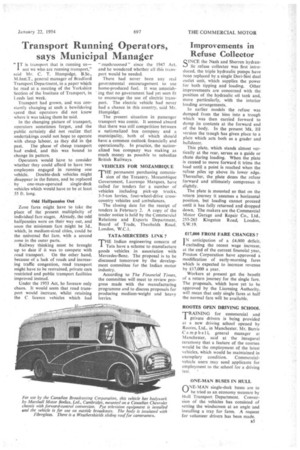Transport Running Operators, says Municipal Manager
Page 39

If you've noticed an error in this article please click here to report it so we can fix it.
"
IT is transport that is running us— not we who are running transport," said Mr. C. T. Humpidge, B.Sc., M.lust.T., general manager of Bradford Transport Department, in a paper which he read at a meeting of the Yorkshire Section of the institute of Transport, in Leeds last week.
Transport had grown, and was constantly changing at such a bewildering speed that operators did not know where it was taking them he said.
In the changing picture of transport, operators sometimes forgot, and the public certainly did not realize that undertakings could not hope to operate with cheap labour, as they did in tbe past. The phase of cheap transport had ended, and this was bound to change its pattern. Operators would have to consider whether they could afford to have two employees engaged in running one vehicle. Double-deck vehicles might disappear in the future, and be replaced by one-man-operated single-deck vehicles which would have to be at least 35 ft. long.
• Odd Halfpennies Out Zone fares might have to take the place of the present multiplicity of individual fare stages. Already, the odd halfpennies were on their way out, and soon the minimum fare might be 3d., which, in medium-sized cities, could be the universal flat fare, with a second zone in the outer parts.
Railway thinking must be brought up to date if it was to compete with road transport. On the other hand, because of a lack of roads and increasing traffic congestion, road transport might have to be restrained, private cars restricted and public transport facilities improved instead.
Under the 1953 Act, he foresaw only chaos. It would seem that road transport would increase, whilst retaining the C licence vehicles which had " mushroomed " since the 1947 Act, and he wondered whether all this transport would be needed.
There had never been any real governmental encouragement to use home-produced fuel. It was astonishing that no government had yet seen fit to encourage the use of electric transport. The electric vehicle had never had a chance in this country, said Mr. liumpidge: The present situation in passenger transport was comic. It seemed absurd that there was still competition between a nationalized bus company and a municipality, both of which should have a common outlook financially and operationally. In practice, the nationalized bus company was making as much money as possible to subsidize British Railways.
VEHICLES FOR MOZAMBIQUE THE permanent purchasing commis' sion of the Treasury, Mozambique Government, Laurenco Marques, have called for tenders for a number of vehicles including pick-up trucks, 3-5-ton lorries, four-wheel-drive crosscountry vehicles and ambulances.
• The closing date for the receipt of tenders is February 2. A copy of the tender notice is held by the Commercial Relations and Exports Department, Board of Trade, Theobalds Road, London, W.C.I.
TATA-MERCEDES LINK?
THE Indian engineering concern of Tata have a scheme to manufacture goods vehicles in association with Mercedes-Benz. The proposal is to be discussed tomorrow by the development committee for the Indian motor industry.
According to The Financial Times, the committee will meet to review progress made with the manufacturing programme and to discuss proposals for producing medium-weight and heavy lorries.




























































































